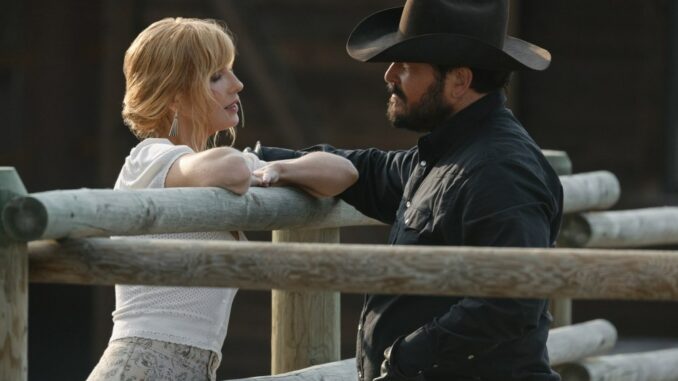
Yellowstone’s Final Chapter: A Poignant Farewell to a Show That Redefined Television
The Yellowstone series finale marked the end of an era for Taylor Sheridan’s modern Western masterpiece. Despite the show’s decline following Kevin Costner’s unexpected departure, the final episode brought a sense of closure that honored the show’s earlier glory days. While Yellowstone stumbled through the latter part of Season 5, its finale reminded viewers of why it became such a cultural phenomenon in the first place — a gritty exploration of family, legacy, and the price of power.
Kevin Costner’s Departure and Its Impact
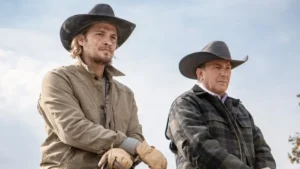
Kevin Costner’s portrayal of John Dutton was the backbone of Yellowstone, grounding the series with his commanding presence and quiet intensity. Costner embodied the patriarch of the Dutton family — a man torn between his love for the land, his family’s future, and the forces of modernity threatening his way of life.
When news broke that Costner was exiting the series before its conclusion, fans were understandably skeptical about how Yellowstone could move forward without its central figure. The absence of John Dutton left a noticeable void in the storytelling, and the second half of Season 5 struggled to regain its footing. Without Costner’s magnetic performance, the show felt disjointed at times, with subplots losing momentum and character arcs feeling rushed.
However, Sheridan’s decision to focus on the remaining Duttons — Beth (Kelly Reilly), Jamie (Wes Bentley), and Rip (Cole Hauser) — helped steer the show toward a meaningful conclusion. By revisiting themes that defined Yellowstone’s earlier seasons, the finale managed to recapture some of the magic that made the show a fan favorite.
A Return to Yellowstone’s Core Themes
At its heart, Yellowstone has always been about family, legacy, and survival. The series finale leaned heavily into these themes, exploring the fractured relationships within the Dutton family and the sacrifices they’ve made to protect their land.
Beth Dutton, as fiery and unpredictable as ever, took center stage in the finale. Kelly Reilly delivered a performance brimming with intensity and emotional depth, reminding viewers why Beth has become one of television’s most iconic characters. Her vendetta against Jamie reached its long-awaited climax, and the final showdown between the two siblings provided some of the most gripping moments of the episode.
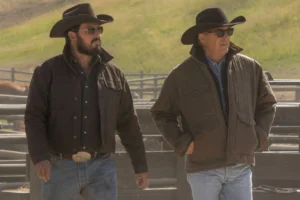
Jamie, played masterfully by Wes Bentley, continued to be a tragic figure in the finale. Torn between his ambitions and his desperate need for acceptance, Jamie’s arc came to a haunting conclusion that underscored the show’s darker themes. Bentley’s portrayal of Jamie as a man consumed by guilt and resentment was one of the standout performances of the finale.
Rip Wheeler, played by Cole Hauser, served as the emotional anchor of the episode. His unwavering loyalty to Beth and the ranch reminded fans of the simple yet powerful love story that has been a cornerstone of Yellowstone’s success. Rip’s scenes were a poignant reminder of the sacrifices made in the name of family and tradition.
A Tribute to the Land and the Legacy
One of Yellowstone’s most enduring characters has always been the land itself. The sweeping vistas of Montana, captured in breathtaking cinematography, have served as the backdrop to the Duttons’ struggles. In the finale, the land once again took center stage, symbolizing both the beauty and burden of the Yellowstone Ranch.
John Dutton’s absence was felt keenly throughout the episode, but his presence lingered in the choices made by his children. The finale paid tribute to John’s legacy by highlighting the unrelenting fight to preserve the ranch — a fight that has defined the Dutton family for generations. Even as the world around them changes, the land remains a constant, a testament to the sacrifices and bloodshed that have secured it.
Not a Perfect Ending, But a Fitting One
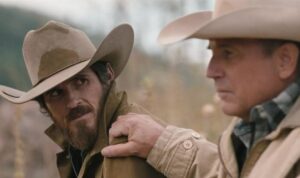
While the finale successfully recaptured much of Yellowstone’s early brilliance, it wasn’t without its flaws. The pacing felt uneven at times, and some storylines were left unresolved. Fans hoping for a tidy conclusion may be disappointed, as Taylor Sheridan chose to embrace ambiguity rather than deliver a neatly packaged ending.
However, this decision feels true to the spirit of Yellowstone. The Duttons’ story has always been messy, complicated, and morally ambiguous. Sheridan’s refusal to offer easy answers reflects the harsh realities the show has explored from the very beginning.
For longtime fans, the finale offered a sense of closure without betraying the essence of the series. It wasn’t about happy endings; it was about honoring the sacrifices made for family, legacy, and survival. In that sense, the finale served as a fitting tribute to the show’s glory days, even if the journey to get there was uneven.
Yellowstone’s Cultural Impact
Despite its challenges in its final season, Yellowstone remains one of the most significant television series of the past decade. Taylor Sheridan’s modern Western reinvigorated the genre, blending family drama with social and political commentary. It captured the struggles of rural America while delivering gripping storytelling and unforgettable characters.
The show’s success has also paved the way for spin-offs and prequels, including 1883 and 1923, which explore the Dutton family’s history. These projects, along with future spin-offs, ensure that the Yellowstone universe will continue to expand and evolve. Even as the original series comes to a close, its legacy will endure.
The Performances That Defined the Finale
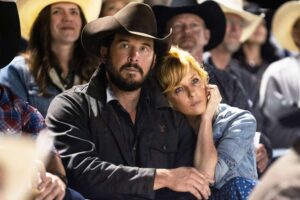
The series finale was elevated by the stellar performances of its cast. Kelly Reilly’s portrayal of Beth Dutton remained a force of nature, blending vulnerability with ruthless determination. Wes Bentley delivered a career-best performance as Jamie, capturing the tragic complexity of his character. Cole Hauser’s Rip Wheeler provided the emotional heart of the episode, while supporting performances from characters like Monica (Kelsey Asbille) and Kayce (Luke Grimes) added depth to the story.
While Kevin Costner’s absence loomed large, his influence on the series was undeniable. The finale honored John Dutton’s legacy, ensuring that Costner’s impact on Yellowstone would not be forgotten.
Final Thoughts
Yellowstone’s series finale brought the Dutton family’s saga to a close with a mix of heartbreak, resolution, and reverence for the land they fought so hard to protect. While the show lost some of its momentum following Kevin Costner’s departure, the finale managed to recapture the raw emotion and gripping drama that made Yellowstone a cultural touchstone.
Taylor Sheridan’s decision to embrace the show’s core themes — family, legacy, and the unrelenting march of change — allowed Yellowstone to end on a high note. It wasn’t perfect, but it was true to the show’s spirit.
In the end, Yellowstone’s finale serves as both a tribute to the Dutton family and a celebration of the series’ legacy. It leaves behind a powerful reminder of what made the show so compelling: its unapologetic storytelling, unforgettable characters, and its reverence for the land that started it all. While fans may mourn the end of Yellowstone, its impact will endure for years to come.
